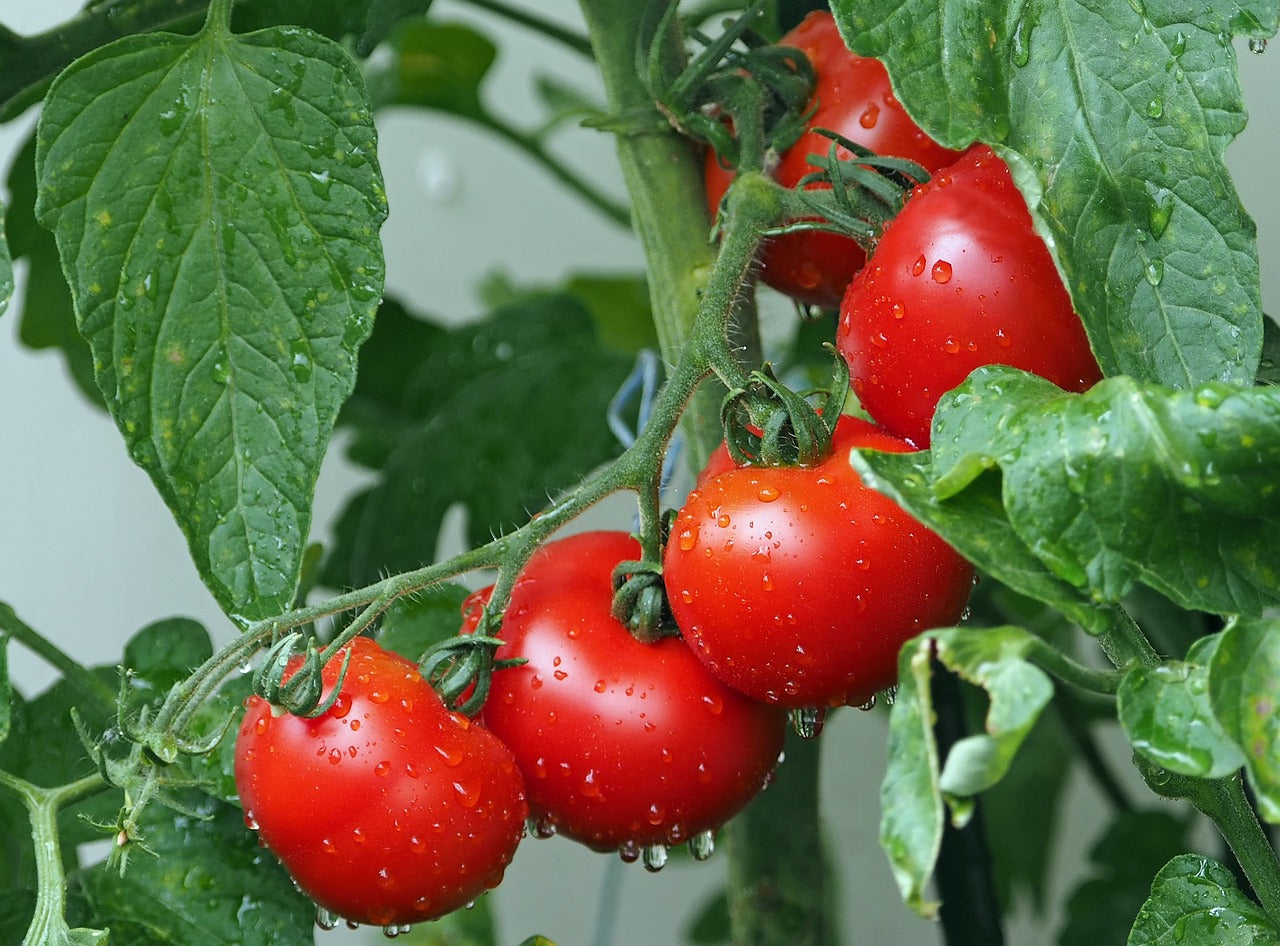Maybe it’s because of the unmatched flavor of a homegrown tomato, or the sheer joy at pulling down a can of garden tomatoes in the middle of winter, like summer in a jar. Maybe it’s the addictive scent of tomato resin on our hands and under our fingernails. Who’s to say? There are countless reasons that tomatoes are staple crops in so many home gardens.
The Best Tomatoes to Grow
The best tomatoes to grow are the tomatoes you love. We grow them to eat fresh or to prepare sauces, galettes, and salads, adding the sweet and acidic zing of summer to all of our favorite recipes. This makes it obvious why, if we have the space, we choose more than one variety of tomato to grow. Most gardeners develop favorites, but in general, when choosing which variety will best fit our needs, the first thing to think about is the long-term plan for the harvest.
Questions to Consider When Growing Tomatoes
In many cases, the answers to the following questions tell us whether we want to grow a determinate or indeterminate variety.
- How much space do I have?
- How long do I want to wait before that first ripe tomato?
- Am I growing for fresh eating and/or for putting away?
With these questions in mind, you can decide which growing pattern of tomatoes you should try.

Determinate Tomatoes
Determinate tomatoes have a set growth limit. The fruit will ripen all at once, typically within a week or two, and the plant will die back after the harvest. Further, determinate tomatoes tend to fruit earlier than indeterminate varieties. These plants are smaller and more bush-like. This feature in particular makes them excellent candidates for container gardening. Determinate tomatoes should never be pruned as this will result in less fruit and a slower yield.
Trellising or Staking Determinate Tomatoes
While all tomatoes like to be staked, determinants definitely need to be staked less than other tomatoes. Because they are smaller and will not live as long, you may only have to provide support for them once early in the season, or maybe not even until they start to set fruit just to ensure the stems don’t split.
Harvesting Determinate Tomatoes
Because determinate tomatoes fruit all at once, you’ll want to watch them closely as the fruit starts setting to make sure you don’t miss the window! Because they don’t set fruit a second time, you’ll have lost your crop entirely if you miss it.
This “miracle” could be a nightmare if what you were looking for is a tomato that is still ripening in September – but if you’d like to “put summer up in a jar,” and enjoy an early crop, these are the varieties to choose.
Indeterminate Tomatoes
Indeterminate varieties are also called "vining" tomatoes. They grow and produce fruit until killed by frost and can reach heights of up to ten feet, although six feet is more average. They will bloom, set new fruit, and ripen fruit continuously throughout the growing season. Because of the size of the plant, indeterminate tomatoes are usually not recommended for container gardening.
Trellising or Staking Indeterminate Tomatoes
Indeterminate tomatoes require trellising or staking to support the large and vining stems. Many growers prune off the suckering branches to concentrate energy into fruit production, but this is not mandatory. However, more research shows that pruning and staking indeterminate tomatoes helps with disease prevention and increases the size of the fruit. Stake the plants, prune the suckers, and give them plenty of space so that air can circulate.
Harvesting Indeterminate Tomatoes
Indeterminate tomatoes will continue to set fruit and ripen throughout the growing season until killed off by a frost. Harvest regularly to encourage more fruiting. Vine-ripened tomatoes are delicious but are also the first one to get picked off by hungry pests! If this is a problem in your garden, you can harvest tomatoes before they’re at their juiciest and let them ripen on your countertop!
Types of Tomatoes
There are three main types of tomatoes: slicing, paste, and cherry. They all shine in different areas of the garden and kitchen, but they are all deeply delicious. These are some great varieties of each type for you to try this year.
Slicing Tomatoes
Slicing tomatoes are the big, juicy, bright tomatoes of your summer dreams. They are great for slicing onto sandwiches, burgers, or a gorgeous caprese salad. The slicing tomatoes from your garden are tastier than the ones from the grocery store and in many cases tend to be meatier.
Mountain Princess - Determinate
This heirloom tomato is a productive variety that produces quickly and early. They are especially suited to a short growing season and produce four to six ounce fruits.

Cherokee Purple - Indeterminate
This heirloom is our most popular tomato and lives up to its praise. It is part of the Slow Food Ark of Taste and produces slightly flattened globes with a unique purplish-pink flesh.

Rutgers VF - Determinate
With an old-time flavor, this heirloom has round fruits saturated with a bright red color. Large and vigorous, this determinate tomato produces early, shows crack resistance, and is widely adapted for hot climates.

Mr. Stripey - Indeterminate
This heirloom tomato has a name that is accurate, yet doesn’t quite convey the brilliancy of its look — red splashed against yellow on delicious, meaty tomatoes.

New Big Dwarf - Determinate
This variety was created before 1915, though the exact year is unknown, by crossing the Ponderosa and Dwarf Champion varieties and could quickly prove to be a favorite in your garden. The plants stay small at about two feet tall and produce a very early harvest of particularly delicious deep pink tomatoes that can reach a weight of up to one pound.

Big Momma - Indeterminate
An amazing, large, meaty tomato with few seeds and the perfect balance of sweetness and acidity. While there is a hybrid tomato called Big Momma, we obtained this one at a seed swap from a gentleman named Larry Phipps, who got the seed from his cousin. This Big Momma is open-pollinated! It’s large enough to make a great slicing tomato but meaty enough to make a great sauce as well.

Paste Tomatoes
Paste tomatoes are varieties that are typically meatier and less juicy than slicing tomatoes. This makes them the best tomatoes for canning, sauces, drying, and more. With less water content, the flavor of the sauce is powerful. Many paste tomatoes are determinate (so you can harvest them all at once for a big batch of sauce), but we have many wonderful indeterminate varieties as well!
Principe Borghese - Determinate
This Italian variety makes the sweetest sun-dried tomatoes around, and it’s great for sauces and salads as well. This plant produces clusters of meaty, red, plum-shaped fruits with few seeds.

Amish Paste - Indeterminate
It’s easy to understand the enduring popularity of this heirloom paste tomato. Thick and meaty fruit with a small seed cavity means a more flavorful and less laborious sauce. The fine texture also makes it great for slicing into salads.

San Marzano - Determinate
This heirloom is the preferred standard for Italian farmers when it comes to reliable and heavy yields and the most delicious sauces imaginable! Compact and prolific producer of bright red, slim, two to three inch plum-type fruits.

Speckled Roman - Indeterminate
These stunners are both speckled and striped in yellow and orange on a bright red base. Thick flesh makes them great for both processing and fresh eating. This is a very productive indeterminate variety.

Roma - Determinate
This is a classic plum-shaped paste tomato with rich flavor and a low seed count. This makes Roma ideal for canning. With vigorous, compact vines, this variety does beautifully in containers.

Crimson Cow - Indeterminate
This paste tomato is purple toned and created by a North Carolina backyard tomato breeder and sauce enthusiast, Richard Spencer. It’s a cross of the Cherokee Purple slicing tomato and the paste tomato known as Cow’s Tit. It has the beautiful coloring of the Cherokee Purple but the meaty texture of the Cow’s Tit, making it a delicious stunner for sauces!

Cherry Tomatoes
Most cherry tomatoes are indeterminate with their sprawling and vining growth habit. This can make them challenging to grow in containers but not impossible. Because the fruit is so much smaller, with a large enough container and decent staking, you can definitely grow these in pots.
Cherry Sweetie - Indeterminate
These cherry tomatoes are super high in sugar — so much so, they may even find their way onto a dessert tray! These long, trailing plants produce an abundance of one inch, vivid red fruits in large clusters. The sweetness and low acidity of these sweeties make them the perfect snacking tomato.

Black Cherry - Indeterminate
This stunning dark-colored tomato has a complex flavor and high, consistent yields. Their flavor mimics those of other dark-colored tomatoes: sweet, but with a deep rather than bright taste. These plants are very vigorous and tall, and the more sun exposure they get, the deeper the color!

Chadwick Cherry - Indeterminate
These disease-resistant vines produce high yields of utterly delicious one ounce red fruits, making them slightly larger than most cherry tomatoes. These tomatoes were selected by master English horticulturalist Alan Chadwick who was an early proponent of biodynamic gardening in the US.

Brown Berry - Indeterminate
Another stunner! These cherry tomatoes have a sweet flavor with a lightly acidic finish and look beautiful in a fresh summer salad. The one inch fruits are a deep red with a coppery, bronze blush on the shoulders.

Lost Marbles - Indeterminate
The Lost Marbles cherry tomatoes have been a standout for flavor in our trials. They are quite disease-resistant and have been known to fruit reliably into October. Our original seed stock came from Good Mind Seeds in Pennsylvania who says this variety was selected from multiple species of wild tomatoes, explaining their excellent blight resistance.

Nightcap - Indeterminate
These large, round, pink-fleshed cherry tomatoes have a dark purple blush on the shoulders. They grow in abundance on rambunctious indeterminate vines.

FAQ About Growing Tomatoes
Can I direct sow tomato seeds?
We do not recommend direct seeding tomatoes in most growing zones, regardless of how early they might produce. Typically, you’d want to start your tomato seeds inside eight to ten weeks before your last frost date. They’ll likely outgrow the original container you seed them in, so stay on top of potting them up so they don’t get root-bound. There are a few reasons for this. Tomatoes are a long-season crop that take a long time to mature. You want there to be ample time for fruiting and ripening on the vine, and you also want this to happen before disease season comes along and potentially kills back some plants!
What kinds of tomatoes can I grow in containers?
Typically, we recommend growing only determinate varieties in containers, but it’s not impossible to grow indeterminate varieties in large containers as well. You’ll just want to ensure you have ample staking or trellising as the vines can get unruly.
Why is my fruit rotting on the vine?
Are the bottoms of your tomatoes rotting? This is what we call blossom end rot, and there’s a fairly easy solution! If this is a problem every year, consider planting alongside a calcium-rich fertilizer. Alternatively, if you notice this early on, apply a water-soluble, fast-acting, calcium-rich fertilizer to your plants. While the fruits that are already rotting cannot be saved — and you should remove these from the plant — you may be able to avoid this happening to the others that are still healthy!
Who’s eating my tomatoes?
While we aren’t the only ones who love the sweet, acidic flavor of a fresh tomato, we don’t always want to share! Deer, dogs, groundhogs and more have all been known to snack on these delicious summer gems. However, did you wake up one morning and your tomato foliage has been munched on? This is most likely the tomato (or tobacco) hornworm. They look exactly the same, distinguished only by the color of the spine on their butt. These caterpillars are the larval stage of the hawk moth and are very good at hiding. Take a good look at your plants and remove any caterpillars you find!

What are some good companion plants for tomatoes?
Our favorite crop to plant next to tomatoes is basil. Yes, because you get to refer to the planting area as “The Pizza Bed,” but also because the rigorous growth habit of the tomatoes help to shade the basil to avoid it getting sun scalded. We also recommend planting tomatoes near calendula, which can deter certain pests, and borage, which deters the tomato (and tobacco) hornworm.
How do I know when a tomato is ready to be harvested?
Tomatoes can be harvested at any stage of growth. Green tomatoes, which are firmer and more acidic, are popular for certain dishes, famously fried green tomatoes. You can also grow tomatoes that mature green such as the Green Zebra (indeterminate, if you were wondering). BUT, you’re probably wondering about when to harvest your pink and red tomatoes. Typically you’d want to harvest when all the green has faded from the skin and it is rich in color. At this stage, press lightly on the bottom of the fruit. If it’s still firm, it may need some more time. If it’s beginning to soften, you’re at the start of your harvesting window. This is also the time when you’ll be competing with other pests (if this is a problem in your garden) for who can eat the sweet tomato first. If this is a common issue, consider harvesting a little early and allowing it to ripen on your counter top for a few more days. This process will take a little longer than on the vine, but it’ll get there!
So, which type of tomato do you want to grow? Indeterminate, determinate, or both? Learning to grow tomatoes can take some practice but is easy enough to do. Sow True Seed offers a wide variety of open-pollinated, heirloom, and organic tomato seeds for you to choose from. There’s something for every grower!
This article was updated on 04/24/2024

|
Article Written by: Hannah Gibbons |
|
About the Author: Hannah Gibbons, an employee at Sow True Seed since 2020, has nearly a decade of experience in the agricultural industry. Their passion for environmental education and regenerative agriculture has been the cornerstone of their work, aimed at making gardening accessible to all. |


